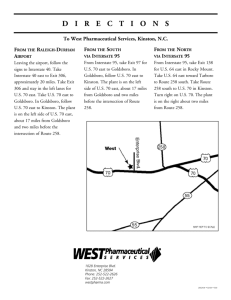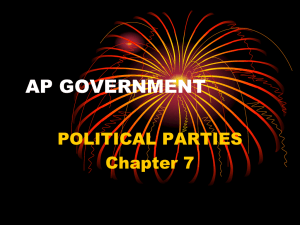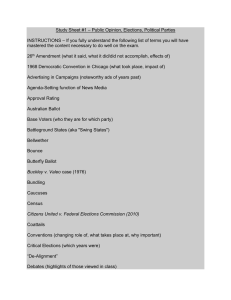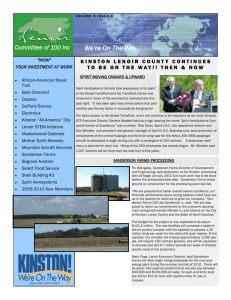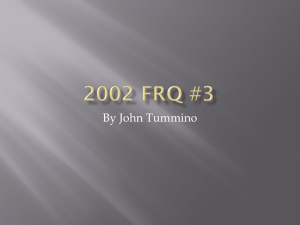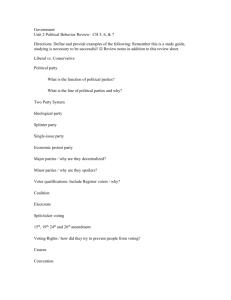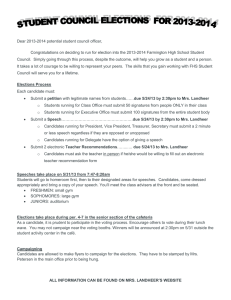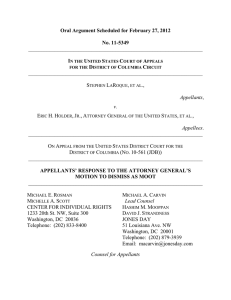________________________________ STEPHEN LAROQUE )
advertisement
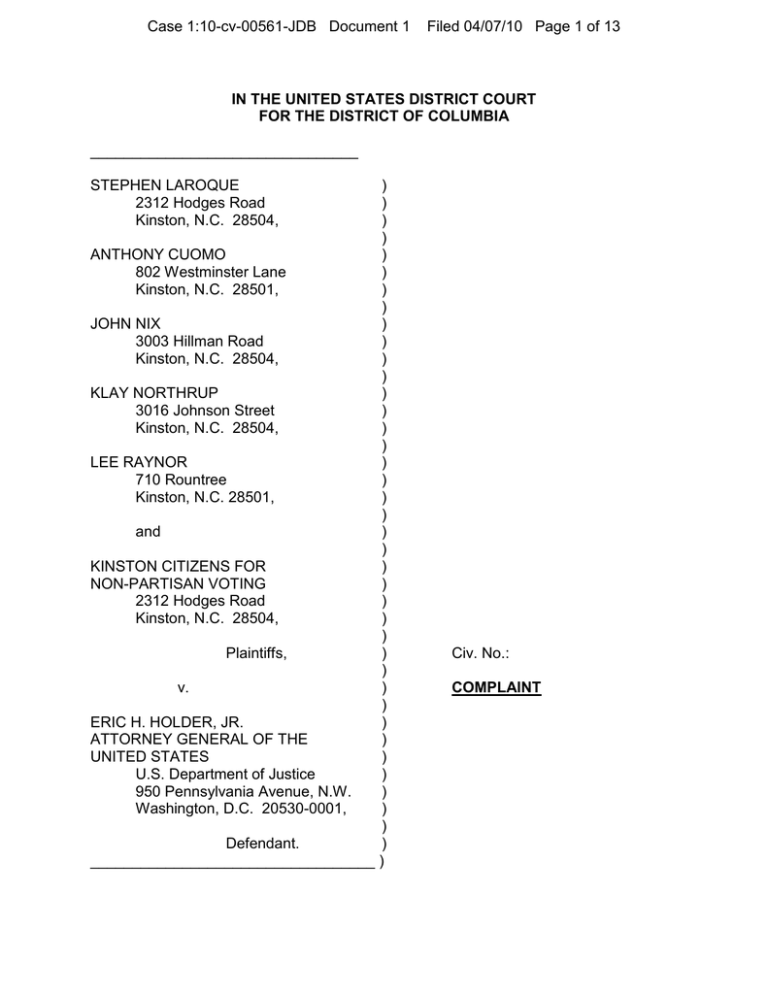
Case 1:10-cv-00561-JDB Document 1 Filed 04/07/10 Page 1 of 13 IN THE UNITED STATES DISTRICT COURT FOR THE DISTRICT OF COLUMBIA ________________________________ STEPHEN LAROQUE 2312 Hodges Road Kinston, N.C. 28504, ) ) ) ) ANTHONY CUOMO ) 802 Westminster Lane ) Kinston, N.C. 28501, ) ) JOHN NIX ) 3003 Hillman Road ) Kinston, N.C. 28504, ) ) KLAY NORTHRUP ) 3016 Johnson Street ) Kinston, N.C. 28504, ) ) LEE RAYNOR ) 710 Rountree ) Kinston, N.C. 28501, ) ) and ) ) KINSTON CITIZENS FOR ) NON-PARTISAN VOTING ) 2312 Hodges Road ) Kinston, N.C. 28504, ) ) Plaintiffs, ) ) v. ) ) ERIC H. HOLDER, JR. ) ATTORNEY GENERAL OF THE ) UNITED STATES ) U.S. Department of Justice ) 950 Pennsylvania Avenue, N.W. ) Washington, D.C. 20530-0001, ) ) Defendant. ) __________________________________ ) Civ. No.: COMPLAINT Case 1:10-cv-00561-JDB Document 1 Filed 04/07/10 Page 2 of 13 I. INTRODUCTION 1. This is an action challenging the constitutionality of Section 5 of the Voting Rights Act of 1965, as amended in 2006 (hereinafter “Section 5”). Plaintiffs are voters, prospective candidates, and proponents of citizen referenda in the city of Kinston, North Carolina, which has been covered by Section 5 pursuant to election data from November 1964. Plaintiffs successfully sponsored and voted for a referendum that would have amended the Kinston city charter to change from partisan to nonpartisan local elections—specifically, to replace the current system where the only candidates for election are the winners of party primaries and eligible unaffiliated candidates able to gather sufficient signatures to gain access to the ballot, with a new system where any candidate can run for election and the candidates are unaffiliated on the ballot with any party. But Plaintiffs’ efforts, as well as the benefits they would have derived from nonpartisan elections as voters and candidates, have been completely nullified because the Attorney General denied preclearance under Section 5. They seek a declaration that Section 5 is unconstitutional and an injunction against any application of that statute to Kinston’s nonpartisan-elections referendum and other future voting changes. II. THE PARTIES 2. Plaintiff Stephen LaRoque is a registered voter and resident of Kinston, North Carolina. He is a former state legislator and is involved in local politics. LaRoque organized a successful petition drive (the "Petition Drive") to place a referendum on the ballot for the November 2008 election that would change the method of local elections from partisan to nonpartisan. The referendum won by a 64% margin and garnered a 2 Case 1:10-cv-00561-JDB Document 1 Filed 04/07/10 Page 3 of 13 majority of votes in 5 of 7 of Kinston’s majority-black precincts. LaRoque intends to offer additional positive changes to Kinston’s electoral system in the future. 3. Plaintiff John Nix is a registered Republican voter and resident of Kinston who voted for the referendum. Nix intends to run for election to the Kinston City Council in November of 2011. He has a direct interest in doing so on a ballot where he is unaffiliated with any party, against opponents similarly unaffiliated, and without the preliminary need to either run in a party primary or obtain sufficient signatures to obtain access to the ballot as a candidate. 4. Plaintiff Klay Northrup is a registered unaffiliated voter and resident of Kinston who voted for the referendum. Northrup intends to run for election to the Kinston City Council in November of 2011. He has a direct interest in doing so on a ballot where he is unaffiliated with any party, against opponents similarly unaffiliated, and without the preliminary need to either run in a party primary or obtain sufficient signatures to obtain access to the ballot as a candidate. 5. Plaintiff Lee Raynor is a registered voter and resident of Kinston. She is involved in local politics, helped organize and run the Petition Drive, and voted for the referendum. 6. Plaintiff Anthony Cuomo is a registered voter and resident of Kinston. He is involved in local politics, helped collect signatures for the Petition Drive, and voted for the referendum. 7. Plaintiff Kinston Citizens for Non-Partisan Voting (“KCNV”) is an 3 Case 1:10-cv-00561-JDB Document 1 Filed 04/07/10 Page 4 of 13 unincorporated membership association dedicated to eliminating the use of partisan affiliation in Kinston municipal elections. Its members consist of Kinston registered voters who have joined the association because they agree with its objectives and its means for achieving them. These members include Kinston voters who supported and voted for the nonpartisan-elections referendum and prospective candidates for Kinston municipal elections who have a direct interest in running in nonpartisan elections. Plaintiffs LaRoque, Nix, Northrup, Raynor, and Cuomo are all members of Plaintiff KCNV. 8. Defendant Eric Holder is sued in his official capacity as the Attorney General of the United States. The Attorney General heads the United States Department of Justice, which is the department in the executive branch of the United States that enforces the Voting Rights Act generally, and Section 5 of the Voting Rights Act in particular. III. JURISDICTION AND VENUE 9. This court has jurisdiction and venue pursuant to 28 U.S.C. §§ 1331, 1343 and 42 U.S.C. § 1973l(b). IV. THREE-JUDGE PANEL 10. Pursuant to 28 U.S.C. §§ 291(b), 2284 and 42 U.S.C. § 1973c(a), Plaintiffs request appointment of a three-judge panel to hear and resolve this Complaint. V. BACKGROUND 11. Kinston is a municipality located in Lenoir County, North Carolina. Lenoir 4 Case 1:10-cv-00561-JDB Document 1 Filed 04/07/10 Page 5 of 13 County is covered by Section 5. 12. Kinston conducts periodic elections for mayor and city council, and these elections are conducted in compliance with the Voting Rights Act, including the preclearance provisions of Section 5. 13. Currently, only 8 of 551 localities in North Carolina hold partisan local elections. 14. In March 2008, Plaintiff LaRoque began to collect signatures on petitions to call for a referendum to amend the charter of the city of Kinston to provide for nonpartisan elections of the mayor and city council. By July 2008, he and Plaintiffs Raynor and Cuomo had collected more than the 1424 signatures required to place the issue on the November 2008 ballot. In August, Plaintiff LaRoque submitted the petition signatures to the Lenoir County Board of Elections and, subsequently, to the Kinston City Council. As required by North Carolina General Statutes §160A-104, the City Council voted to place the referendum on the ballot for the November, 2008 election. 15. Kinston voters approved the referendum by almost a 2 to 1 margin (64%), and the referendum passed in 5 of the 7 precincts where blacks were a majority of voters. 16. Since Kinston is a political subdivision of Lenoir County, which is covered by Section 5, Kinston submitted the change to nonpartisan elections to Defendant Holder, the Attorney General, for preclearance. 17. No voting change from Kinston or Lenoir County had previously ever been 5 Case 1:10-cv-00561-JDB Document 1 Filed 04/07/10 Page 6 of 13 denied preclearance under Section 5. There has also never been a finding that Kinston engaged in discriminatory practices in voting. 18. The Acting Assistant Attorney General for the Civil Rights Division, Loretta King, exercising delegated authority from the Attorney General, objected to the change in a letter dated August 17, 2009. 19. The stated reason for the objection was that the “elimination of party affiliation on the ballot will likely reduce the ability of blacks to elect candidates of choice,” in a city where, according to the objection letter, blacks constitute a least 62.6% of the total population (66.6% based on current estimates), 58.8% of the voting age population and 64.6% of registered voters. Objection Letter, pp. 1-2. The objection letter contended that the change had a discriminatory racial effect because, “while the motivating factor for this change may be partisan,” “statistical analysis supports the conclusion that given a change to a nonpartisan election, black preferred candidates will receive fewer white cross-over votes” because nonpartisan elections will not allow “either [an] appeal to [Democratic] party loyalty or the ability to vote a straight ticket” for all Democratic candidates. Id. at 2. Accordingly, since all “black-preferred candidates” were Democratic and “given that the city’s electorate is overwhelmingly Democratic,” Section 5 prohibited any change which would likely diminish “cohesive support” for Democratic candidates of any race. Id. 20. The Justice Department does not seek and has not sought to apply Section 5’s protections to nonminority voters, and has never denied preclearance to a voting change in any jurisdiction on the ground that it diminishes the electoral power or 6 Case 1:10-cv-00561-JDB Document 1 Filed 04/07/10 Page 7 of 13 chances of success of nonminority voters on the basis of their race. 21. In July 2006, Congress reauthorized Section 5, extending it for twenty-five years (until 2031). It relied on generalized findings which do not specifically identify evidence of continuing intentional discrimination in covered jurisdictions. Nor did it have evidence that adequately distinguished conditions in covered jurisdictions from those in non-covered jurisdictions in a way that would justify the continuing difference in treatment for another twenty-five years. 22. The conditions of 1964 that caused Lenoir County to be covered by Section 5 have long been remedied. Lenoir County had 72% voter turnout for the November 2008 election, and 67% of its population is registered to vote. Nonetheless, under the 2006 reenactment coverage formula, Lenoir County is a covered jurisdiction and will continue to be covered until 2031. Congress’ determination that Lenoir County should continue to be covered was based upon data that is more than 45 years old and fails to account for current political conditions. There has never been any analysis of the conditions in the City of Kinston, where black citizens constitute a super-majority of the population and registered voters. 23. Section 5 requires covered jurisdictions and any political subdivisions contained therein to seek preclearance for any changes in voting practices or procedures. The preclearance process is costly and burdensome and requires unnecessary and disruptive delays. It also deprives local jurisdictions of essential attributes of self-governance, including jurisdictions, like Kinston, where minority citizens predominate, and even with respect to measures, like the nonpartisan election 7 Case 1:10-cv-00561-JDB Document 1 Filed 04/07/10 Page 8 of 13 referendum, that are apparently supported by a majority of minority voters. 24. In 2006, Congress did not simply extend Section 5’s substantive mandate on covered jurisdictions. It significantly expanded the substantive standards to coerce jurisdictions to maintain and adopt race-based electoral schemes that prefer certain groups. 25. First, Congress expanded the prohibition against voting changes with the purpose or effect of “denying or abridging the right to vote,” 42 U.S.C. 1973c(a) (emphasis added), to also prohibit changes with the purpose or effect of “diminishing the ability of any citizens . . . to elect their preferred candidates of choice,” id. § 1973c(b) (emphasis added). The Justice Department and the 2006 Congress interpret Section 5 to protect only “members of a racial or language minority group.” See 28 C.F.R. § 51.54(a); see also Pub. L. No. 109-246, § 2(b)(9) (“racial and language minority citizens”). This 2006 amendment thus established a floor for minority electoral success in all covered jurisdictions until 2031, regardless of whether minorities in those jurisdictions have an equal opportunity to elect their preferred candidates or to participate in the political process under the voting change, and regardless of whether there are compelling reasons supporting the voting change. 26. Second, Congress authorized the Attorney General to require enhancement of minority-preferred candidates’ electoral success by authorizing Section 5 objections not only to changes with a retrogressive purpose, but also to those which the Attorney General deems to have been motivated by “any discriminatory purpose.” 42 U.S.C. § 1973c(c) (emphasis added). Particularly given the Justice Department’s 8 Case 1:10-cv-00561-JDB Document 1 Filed 04/07/10 Page 9 of 13 Section 5 enforcement record concerning changes that do not increase minoritypreferred candidates’ success to the maximum practicable extent, this expansion of Section 5’s scope constitutes at least an implicit command for covered jurisdictions to engage in race-based voting practices and procedures. 27. But for Section 5’s presumptive invalidation of the change to nonpartisan elections and the Attorney General’s refusal to eliminate that barrier by preclearing the change, Kinston would now have such nonpartisan elections. 28. Section 5’s perpetuation of the partisan election scheme fundamentally alters the competitive environment in which Plaintiffs Nix and Northrup will run. It directly increases the burdens and costs for candidates like Nix and Northrup to be placed on the ballot. Compare, e.g., N.C. Gen. Stat. §§ 163-292, 163-294.2 (allowing any putative candidate to run in a nonpartisan election), with, e.g., id. § 163-106, 163111, 163-122, 163-291, 163-296 (requiring putative candidates in a partisan election to obtain either 40% of the vote in a party primary or signatures from 4% of all registered voters). Moreover, Section 5’s perpetuation of the partisan election scheme forces candidates like Nix and Northrup to associate with a political party or disassociate from all of them, thus burdening their freedom of political association. It also forces them to anticipate and respond to a broader range of competitive tactics and issues than otherwise would be necessary. In addition, it substantially harms their chances for election by, among other things, making party affiliation a factor in voter’s choices. 29. The denial of Section 5 preclearance has completely nullified all of Plaintiffs’ efforts in support of the referendum. It has also nullified and infringed their 9 Case 1:10-cv-00561-JDB Document 1 Filed 04/07/10 Page 10 of 13 right under North Carolina law to participate in the electoral, political and law-making process through citizen referenda. Moreover, the partisan election scheme perpetuated by Section 5 will, relative to nonpartisan elections, impose additional burdens and costs on candidates they support in running for, and being elected to, the relevant local offices. Partisan primaries and general elections also burden their right to politically associate, or refrain from associating, with others. 30. Section 5, particularly as implemented by the Attorney General, denies Plaintiffs equal, race-neutral treatment, and an equal opportunity to political and electoral participation, by subjecting them to a racial classification and by intentionally providing minority voters and their preferred candidates a preferential advantage in elections. 31. Section 5 poses immediate or threatened injury to members of Plaintiff KCNV who would have standing to challenge Section 5 in their own right, including Plaintiffs LaRoque, Nix, Northrup, Raynor, and Cuomo. And Plaintiff KCNV’s purpose of eliminating partisan municipal elections in Kinston is germane to those interests that give its members standing to sue. Neither the claim asserted by Plaintiff KCNV nor the relief requested require the participation of KCNV’s members. VI. CLAIMS Claim I 32. Plaintiffs incorporate paragraphs 1-31 of this complaint. 33. Section 5 exceeds Congress’ powers because it is not appropriate 10 Case 1:10-cv-00561-JDB Document 1 Filed 04/07/10 Page 11 of 13 legislation to enforce either the Fourteenth Amendment or the Fifteenth Amendment. 34. Section 5, as amended and extended in 2006, is not a rational, congruent or proportional means to enforce the Fourteenth and Fifteenth Amendment’s nondiscrimination requirements and, in fact, undermines and violates those nondiscrimination guarantees. This is so because, among other reasons, there is no continuing justification for Section 5’s extraordinary burdens on and denials of local selfgovernance; there is no persuasive or even rational reason for selectively visiting those burdens on certain jurisdictions based on electoral results from many decades ago; there is no rational or sufficient reason for imposing on covered jurisdictions alone raceconscious requirements in tension with the Constitution and Section 2 of the Voting Rights Act; a continuation of Section 5 until today and 2031 is completely out of proportion to any legitimate, remedial or preventive objective; making Section 5’s substantive requirements more onerous in 2006 than they were in 1965 is irrational and not congruent or proportional; and the more onerous 2006 standards do not broadly enforce the nondiscrimination guarantees of the Fourteenth and Fifteenth Amendments, but instead require actions that undermine and violate those Amendments. Claim II 35. Plaintiffs incorporate paragraphs 1-34 of this complaint. 36. Section 5, as amended in 2006, which authorizes denial of preclearance to changes which improve (or do not diminish) minority voting strength and which also affirmatively prohibits all changes which diminish the ability of select minority groups to elect their preferred candidates, violates the nondiscrimination requirements of the Fifth, 11 Case 1:10-cv-00561-JDB Document 1 Filed 04/07/10 Page 12 of 13 Fourteenth and Fifteenth Amendments, particularly as enforced by the Attorney General. 37. At a minimum, Section 5, as amended in 2006, is presumptively unconstitutional and requires the most searching judicial scrutiny, which it cannot survive. VII. REQUEST FOR RELIEF WHEREFORE, Plaintiffs respectfully request that this Court enter a judgment for the Plaintiffs (1) declaring that Section 5 unconstitutionally exceeds Congressional authority; (2) declaring that the Section 5, as amended in 2006, violates the Fifth, Fourteenth and Fifteenth Amendments to the U.S. Constitution, particularly as applied by the Attorney General, both generally and in his specific refusal to permit Kinston’s change to nonpartisan elections; (3) enjoining the Attorney General from enforcing Section 5 against Kinston’s change to nonpartisan elections; (4) enjoining any enforcement of Section 5 against Kinston in the future; and (5) any other relief the Court deems just and proper. 12 Case 1:10-cv-00561-JDB Document 1 April 7, 2010 Filed 04/07/10 Page 13 of 13 Respectfully submitted, /s/ Michael A. Carvin ____________________________ Michael A. Carvin D.C. Bar No. 366784 Noel J. Francisco D.C. Bar No. 464752 Hashim M. Mooppan D.C. Bar No. 981758 David J. Strandness D.C. Bar No. 987194 JONES DAY 51 Louisiana Ave., NW Washington, DC 20001-2113 (202) 879-3939 /s/ Michael E. Rosman _____________________ Michael E. Rosman D.C. Bar No. 454002 Michelle A. Scott D.C. Bar No. 489097 CENTER FOR INDIVIDUAL RIGHTS 1233 20th St. NW, Suite 300 Washington, DC 20036 (202) 833-8400 Attorneys for Plaintiffs 13 Case 1:10-cv-00561-JDB Document 1-1 Filed 04/07/10 Page 1 of 2 Case 1:10-cv-00561-JDB Document 1-1 Filed 04/07/10 Page 2 of 2

